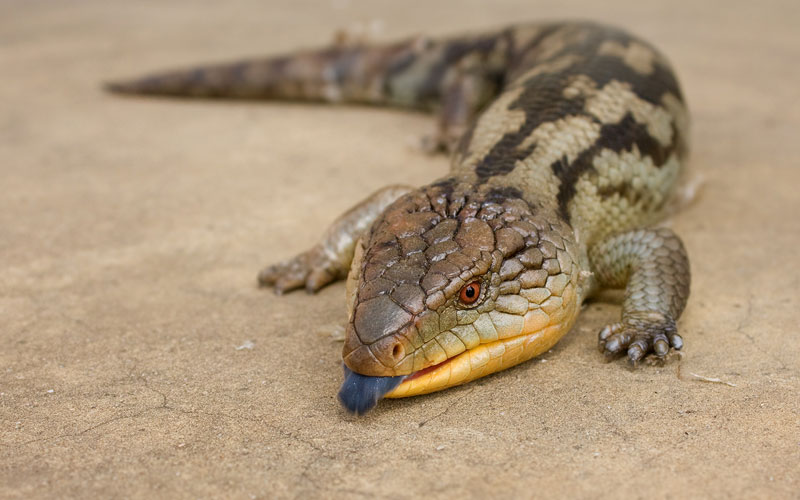Have you ever stumbled upon a blue-tongue in your garden? Here are 10 things you might not know about Australia’s most well-known lizards.
- Their tongue is used to warn away enemies
Its bright blue colour, in combination with their pink mouth, scares potential predators away. Their main threats include birds such as Kookaburras and eagles, snakes, and domestic animals. - They can bite
They may look cute to some, but be careful around them. While they’re not that dangerous to us humans, they may still leave you with a bruise if you cause them to feel threatened. - They can live for up to 30 years in the wild
Provided they can avoid being gobbled up before that of course. As pets, they’ve been known to live to around 20 years, which is still much longer than a cat or a dog. - They’re omnivorous
This means they eat both plants and other animals. Their favourite foods include berries and flowers but also common garden pests like snails (gross!) as well as beetles and other insects. So if you find one in your garden, it’s not a bad thing at all. - They live alone for most of the year
Blue-tongue lizards are known as solitary creatures, and only hang out in pairs for the few months when it’s time to make little blue-tongue babies. - Blue tongue lizards can be found outside Australia
Even though we tend to think of them as Australian only, there is one species of blue-tongue that can also be found on some small Indonesian islands. The Eastern Blue Tongue, the most famous species, is only found here in Australia though. - They don’t lay eggs
Unlike other reptiles like snakes, turtles or crocodiles, blue-tongue lizards don’t lay eggs. They give birth a lot like mammals which is pretty rare for a lizard. Watch out for baby blue tongues between December and January each year. - Avoid snail pellets and be careful with lawnmowers
While it may be frustrating to have snails eating your garden, if a blue-tongue lizard eats a poisoned snail, it might become poisoned too. And while other creatures may run from the sound of a lawnmower, blue-tongues choose to hide so be careful and keep your eye out. - Gardens are one of their favourite places
Blue-tongues adjust fast to us and won’t mind sharing your garden with you for a long time. They like to stay in the same place for a while, once they’ve found a good one. - They can make great pets
If you’re looking for something a bit different from a cat, dog, bird or fish, blue tongues are one of the safer, least troublesome reptiles you can own. You don’t even need a reptile license, however taking them from the wild is prohibited, so talk with your local vet or a reptile breeder to make sure you have all the right equipment first. For more information on owning a reptile, read our helpful blog here.


Leave a Reply